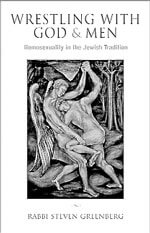Steven Greenberg talks about gay Orthodox Jews and tying the knot
Rabbi Steven Greenberg’s friendly face first greeted us in Sandi Dubowski’s award-winning documentary “Trembling Before G-d.” Here was a gay Orthodox Jewish clergyman who insisted that it was alright to be a gay Orthodox Jew, a stance not particularly popular in the Orthodox community. In fact, some rabbis have noted that gays, according to God, should be put to death.
Now in his new book, “Wrestling With God & Men: Homosexuality in the Jewish Tradition,” Greenberg explains the roots of homophobia within Judaism and posits his own reinterpretations of ancient biblical texts, including Leviticus, that do not define homosexuality as a moral shortcoming.
Phoning the New York rabbi in Los Angeles, where he was visiting with his family, I chatted with him about his book, not always getting the answers I expected.
I noted that he writes: “For many gay Jews, homosexuality is not on the line; Judaism is.”
“That is true for many Jews who are not Orthodox,” Greenberg responded, “because what they’ve experienced is that Judaism is somehow alive with rejection of their identity. Whatever Jewish structure they have connected with is really associated with family and children and all that. Basically, Judaism doesn’t make room for gay life.”
Many Reform synagogues do, however, embrace gays and lesbians wholeheartedly, so why would any self-respecting queer force himself or herself to experience all the hate and rejection Orthodox Judaism shells out?
“Some people might very reasonably not want to be Orthodox Jews,” Greenberg said. “In fact, that has been the most common response. Many have left their communities of origin. But increasingly some gay and lesbian people are no longer leaving or remaining silent. They are no longer coming up with some constrained way of living, either a celibate life or a kind of married life that’s contorted. Gay Jews are now beginning to stick out and say they’re gay. Until very recently, they were given very few options to stay in traditional Jewish communities.”
“Trembling Before G-d,” now available on DVD, documents the few success stories, but the effort to achieve a zone of personal comfort often seems to equal that of squeezing a size ten foot into size eight pumps.
That aside, what about gay marriages, an issue confronting mainstream politics at every level?
Greenberg admitted he has been approached to perform such ceremonies for gay Orthodox couples. He has apparently refused. His noncommittal response was: “I am still studying the question. I’ll put it this way. What I want to say is that I want to take my time in this for all sorts of reasons.
“Right now a Jewish wedding is filled with heterosexual metaphor,” he continued, “and it’s a beautiful, beautiful experience to be at a Jewish wedding, at a heterosexual wedding. It drinks of narrative stories that are not necessarily easily translatable to the experience of two men or two women. So before I do sacred unions between two men and two women, I want to be able to have a better sense of what God is up to in our love.”
The rabbi took a deep breath, before elaborating, in a way that leave some gay marriage activists hoping for more.
“I want to be able to use very old resources to affirm what God is up to in our love because if two people love each other and want to live together for the rest of their lives, that is an occasion for a party, but it’s not yet a wedding,” Greenberg explained. “A marriage is about weaving the love of two into a family, a community, and ultimately into a cosmic vision, into some kind of divine economy. You have to be able to ask, ‘What is God up to in the love of these two people that makes their love much more than the love of another two?’ Then you have what I would call a very sacred moment. We have to figure out what that is before we run and mimic a heterosexual wedding. So you know, I’m thinking about it.”
Another issue, one ignored in Greenberg’s book, is circumcision, a practice falling into more and more disfavor. Ignoring the inherent dangers of the operation and the decrease in penile sensitivity it causes, this procedure has always been at the center of Judaism. Does Greenberg believe the Jewish religion will ever change its take on the snipping?
“Historically I can tell you that it’s as old it comes,” the rabbi responded. “It’s the very first commandment that Abraham is given after he’s told to leave his home and go to the Promised Land. It is the sign of the covenant, and we have pretty strong evidence that no Jewish community has survived that didn’t keep it.
Apparently, circumcision is employed as a way of delineating Jews from non-Jews.
“It certainly serves in that way,” Greenberg agreed. “It also serves as a way to embody, at least for men, the belonging that is not only about your will, but about your physical being. You know, to be Jewish is very different than having a Christian identity in this way. A person born Christian who rejects Christianity would be hard-pressed to be called a Christian. But a Jew born a Jew who rejects Judaism is in the eyes of the community a Jew. They can’t ever ‘unbecome’ a Jew because it’s more than a belief system. So at least in the eyes of the community,” Greenberg said, “we’re not just a people of belief or faith or practice. We are what Sander Gilman calls, ‘the people of the body.’ So, what a wonderful way to mark their uniqueness with a ritual that celebrates the presence of the body in God’s concern.”
Apparently, another wonderful way to celebrate Judaism would be if Greenberg had his own synagogue, one which served as a home base for gay Orthodox Jews. Instead the rabbi is a senior teaching fellow at CLAL, the National Jewish Center for Learning and Leadership. Why no temple? Is it a lack of funding?
“It’s more complicated,” Greenberg insisted. “I haven’t had a rabbinate for 20 years. I’ve been an educator. But even if I wanted to, no affiliated Orthodox congregation would get away with having with me as their rabbi. So it would have to be an unaffiliated Orthodox congregation of which there are let’s say 2,000 in the United States all together. So there are places I could go as an Orthodox rabbi but very few. As for my aim, I would really not want to be the rabbi of a gay and lesbian congregation. I want to be the rabbi of a congregation.”
We also publish:



































